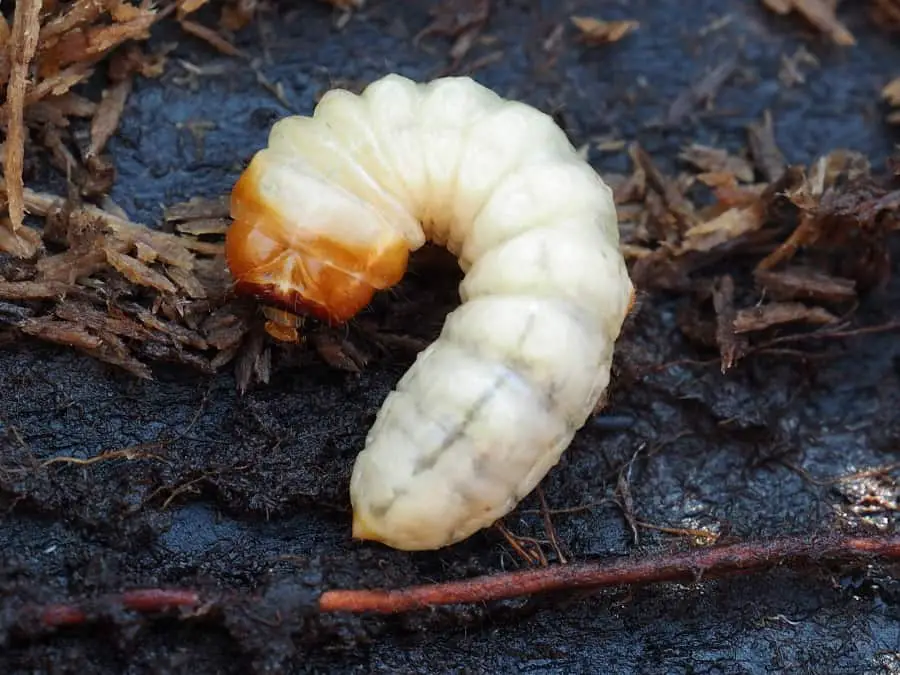Love them or hate them, you cannot deny that grubs are an essential part of your backyard ecosystem. Sure, they may occasionally attack your lawn and plants, but they also help with recycling soil nutrients and attracting a varied cast of hungry critters.
Squirrels and many types of creatures and critters eat grubs in your lawn. Grubs can attract these carnivores and omnivores: moles, skunks, squirrels, raccoons, dogs, birds, and even humans! Grubs are the larva stage of later adult insects that eat the roots of plants.
Today we focus on grubs’ position in the backyard food chain. We take a look at the creatures that could potentially prey on larvae on the long road to full adulthood. We also look at what grubs like to eat as we get to know our wriggly friends better. Let’s get started.

Contents
What Eats Grubs In Your Lawn?
The sight of grubs is, quite often, regarded as a cause for alarm by most property owners. Fearing the worst, many people resort to potentially drastic (and pricey) solutions for a problem that could be solved by nature.
Unless you are facing a whole army of grubs, you can trust the ecosystem to take care of your grub “problem”.
You see, grubs (or insect/ beetle larvae) have many natural predators, primarily because they are at such a vulnerable stage of their lives. A whole range of creatures regards grubs as easy pickings and will make quick work of them.
Moles Eat Grubs
Because of their shared real estate, moles are perhaps the main threat to growing larvae. Along with earthworms, grubs are an easy meal for hungry moles. Grubs tend to burrow small tunnels as they eat, which leaves an easy trail for moles to follow.
Mole tunnels can become a real problem if a sizeable population of moles moves in your yard.
Squirrels Eat Grubs
Squirrels, famed for their love of nuts, are also known to partake in the occasional grub. However, unlike most of the animals, we’re discussing here, squirrels will not cause too much damage in their pursuit of grubs. That said, they may dig up the lawn to bury a grub for later consumption.
Raccoons Eat Grubs
Raccoons have gained notoriety as neighborhood bandits that are willing to do it all in the name of survival. Their omnivorous nature means that anything is on the menu…including grubs. The larvae serve as a quick protein boost for the thieving critters, which have been known to dig holes and pull up lawn grass in pursuit of the wriggly snack.
Raccoons are a menace that can cause significant damage to your yard. Even worse, raccoons might come over for your grubs…but stick around for the trash. Before you know it, you could be playing host to a whole gang of them since they breed so quickly.
If you are looking for a fast solution to kill an infestation of grubs yourself, then I recommend this Scotts brand grub killer found on Amazon that you can apply to your lawn to fix the problem.
Skunks Eat Grubs
Skunks also love munching on grubs, and they employ many of the same hunting tactics as raccoons. This cute little creature can scuff up your yard in pursuit of a few grubs.
As you know, skunks also have a problematic defense mechanism. These animals secrete a foul-smelling musk from special scent glands towards any perceived threats to buy time to escape. This means if your dog runs over to investigate the creature digging up the yard, he could be in for a smelly awakening!
Canines Eat Grubs
There are plenty of other carnivores that aren’t too lazy to dig up some earth and pick out some grubs if pickings are slim. Foxes and coyotes are used to hunting bigger prey items but they do not mind the quick morsel.
Much like dogs (which also eat grubs, by the way), foxes and coyotes can dig up your turf for grubs. They can also carry and spread diseases such as rabies to your family pets. Coyotes can also prey on family dogs, cats, and livestock. Coyotes even may pose a threat to small children.
Birds Eat Grubs
Although grubs have plenty of land-based predators to worry about, the biggest threat to their goal of reaching adulthood comes from the skies.
Insectivorous and omnivorous birds are very fond of grubs. The larvae are pretty easy to spot and are virtually defenseless against sharp beaks. With an almost endless list of insectivorous birds, the sharp beaks are a constant threat.
Wrens, robins, flycatchers, warblers, swallows, swifts, and nightjars are just some of the species that consume grubs at an almost industrial rate. Heck, even free-range chickens are a threat to grubs.
Unlike some of the grub-hunting mammals mentioned here, birds do not cause any significant damage to yards. Their pecks do not disturb lawn grass in any discernible way. Also, the birds that hunt grubs tend to be light on their feet, which reduces the damage.
As far as natural solutions to grub infestations, there’s no beating birds. Birds are highly efficient hunters. They are especially prolific during their breeding seasons, when chicks can be fed as much as once per half hour. A flock of birds will make quick work of grubs before they attract more problematic predators.
To see some more of my articles like this…
- Pine Tree Roots: How Far They Spread and How To Remove Them
- Should You Aerate Before, During, or After Rain? (Answered)
- How And Why To Compost Bones (Home Composting Tip)
Can Humans Eat Grubs?
The other animals that have been known to consume grubs on occasion are human beings!
That’s right, grubs are a great source of protein for people as well. Countless cultures all over the globe regard beetle larvae as a delicacy. They are easy to catch and prepare, which is especially beneficial while on the go. Ancient tribes relied on grubs and other insects as “power-ups” during long hunts and nomadic treks.
Scientific research has revealed that consumption of grubs and insects is much friendlier on the environment than other traditional meat industries. You see, farms that produce pork, beef, and chicken also produce large quantities of harmful gases such as methane and CO2. As a result, insects and grubs are a greener protein source.
Therefore, if you love eating grubs, an “invasion” could very well be a buffet!
What Do Grubs Eat?
Grubs mostly eat grassroots or leaves, depending on the type of grub and the stage of development.
Since most beetles lay their eggs underground, any emerging larvae will spend the first stages of life underground. To survive, the larvae eat grassroots day and night.
If the species in question is a ground surface grub, it will eventually emerge aboveground. Ground surface grubs primarily eat grass leaves until they morph into fully-fledged adults.
Underground grubs remain below the ground surface for the majority of the larva stage. As such, they survive on a diet of grassroots.
In large quantities they can do damage to a lawn, but if some kinds of animals hunt them, so could they.
The Final Touches On What Eats Grubs In Your Lawn…
Though grubs are a vital part of the ecosystem in your lawn, they can become over populated and destroy the grass by eating the plants from underneath. It is then that you will be thankful that they are delicious sources of food for their natural predators.
Many different types of animals can help you and even ones that you may be willing to set loose on your property to do the work.
Just keep in mind that the goal is not to kill them off permanently. This could have a chain reaction in the local animal and plant population that you may regret.
Here are some more articles you will like…
- Pine Tree Roots: How Far They Spread and How To Remove Them
- Should You Aerate Before, During, or After Rain? (Answered)
- How And Why To Compost Bones (Home Composting Tip)
References
https://animals.mom.com/birds-eat-termites-5162.html
https://neeness.com/do-squirrels-eat-grub-worms/#Do_squirrels_eat_grubs
